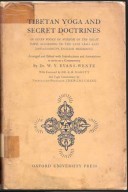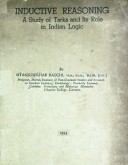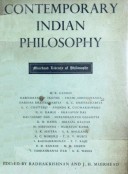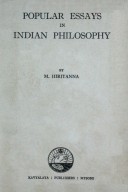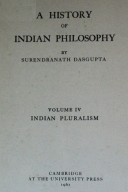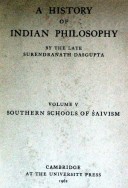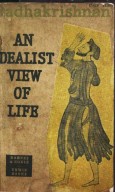Tìm Sách
Sách tiếng Anh-English >> Tibetan Yoga and Secret Doctrines
Thông tin tra cứu
- Tên sách : Tibetan Yoga and Secret Doctrines
- Tác giả : W. Y. Evans Wentz
- Dịch giả :
- Ngôn ngữ : Anh
- Số trang : 389
- Nhà xuất bản : Oxford University Press - London
- Năm xuất bản : 1965
- Phân loại : Sách tiếng Anh-English
- MCB : 12010000002825
- OPAC :
- Tóm tắt :
Tibetan Yoga and Secret Doctrines
or Seven Books of Wisdom of the Great Path
W. Y. Evans Wentz
PREFACE TO THE FIRST EDITION
As in the Tibetan Book of the Dead and in Tibet`s Great Yogi Milarepaso in this book, the third in a threefold series, my aim has been to place on record not only a catena of carefully made translations of texts which are yet almost unknown in Occidental countries, but also a body of orally transmitted traditions and teachings relating to the texts, which I received from the late Lama Kazi Dawa-Samdup, who was my Tibetan guru.
The present work thus contains much that is new to Western thought, and much that, apart from its value for philosophy and religion, is interesting anthropologically. It should prove to be of the same quality and public appeal as the two volumes of the series which have already been published. Perhaps it may be found to be the most valuable member of the trilogy, in much as it gives the very texts of some of the principal yogas and meditations which many of the most illustrious Tibetan and Indian philosophers, including Tilopa, Marpa, and Milarepa, employed in attaining Right Knowledge…
TABLE OF CONTENTS
REFACE TO THE FIRST EDITION
DESCRIPTION OF ILLUSTRATIONS
FOREWORD
PREFACE TO THE SECOND EDITION
YOGIS COMMENTARY
GENERAL INTRODUCTION
I. The importance and original sources of this volume
II. The commentary
III. Some misconceptions concerning Buddhism
IV. The incompleteness of the Occident`s Knowledge of Buddhism
V. The Joyous Optimism of Buddhism
VI. The wisdom of the Mahayana
VII. The yoga Philosophy
VIII. Yoga and Religion
IX. Buddhistic yoga
X. The Psychology of the Yogis Visualizations
XI. Karma and Rebirth
XII. The Exoteric Versus the Esoteric Teachings
XIII. The translating an Editing of the Texts
XIV. The Unity and Practical Value of the Texts
XV. The New Renaissance and the Matters of Wisdom
BOOK I
THE SUPREME PATH OF THE DISCIPLESSHIP:
THE PRECEPTS OF THE GURUS
THE INTRODUCTION
I. The book`s Compiler and his Fellow Disciple
II. The Transmission of the Teachings
III. The texts of the Precious Rosary
IV. The Precepts Compared with “Elegant Sayings”
V. The ten things not to be Avoided
VI. The ten things one must know
VII. The ten things to be practiced
VIII. The ten things to be persevered in
IX. The ten incentives
X. The ten errors
XI. The ten resemblances wherein one may err
XII. The ten things wherein one erreth not
XIII. The thirteen grievous failures
XIV. The fifteen weaknesses
XV. The twelve indispensable things
XVI. The signs of a superior man
XVII.
BOOK II
THE NIRVANIC PATH: THE YOGA OF THE GREAT SYMBOL
THE INTRODUCTION
I. The history of the Great Symbol Teachings
II. The texts and the translation
III. The character of the Great Symbol Teachings
IV. The Line of the Gurus
THE OBEISANCE AND FOREWORD
PART I: THE PRELIMINARY INSTRUCTIONS: THE TEMPORAL AND SPIRITUAL TEACHINGS
PART II: THE ESSENTIAL SUBJECT MATTER
THE COLOPHON
BOOK III
THE PATH OF KNOWLEDGE: THE YOGA OF THE SIX DOCTRINES
THE INTRODUCTION
I. The four classes of Tantras
II. The Doctrine of the Psychic-Heat
III. The Doctrine of the Illusory Body
IV. The Doctrine of the Dream-State
V. The Doctrine of the Clear-Light
VI. The Doctrine of the After-Death State
VII. The Doctrine of the Consciousness-Transference
THE OBEISANCE AND FOREWORD
CHAPTER I: THE DOCTRINE OF THE PSYCHIC-HEAT
CHAPTER II: THE DOCTRINE OF THE ILLUSORY BODY
CHAPTER III: THE DOCTRINE OF THE DREAM-STATE
CHAPTER IV: THE DOCTRINE OF THE CLEAR LIGHT
CHAPTER V: THE DOCTRINE OF THE AFTER-DEATH STATE
CHAPTER VI: THE DOCTRINE OF CONSCIOUSNESS- TRANSFERENCE
THE COLOPHON
BOOK IV
THE PATH OF TRANSFERENCE: THE YOGA OF CONSCIOUSNESS-TRANSFERENCE
THE INTRODUCTION
PART I: THE PROFOUND PATH OF CONSCIOUSNESS-TRANSFERENCE
PART II: THE TRANSFERENCE OF THE CONSCIOUSNESS OF THE DECEASED
PART III: THE DESCRIPTION OF THE LINE OF THE GURUS
BOOK V
THE PATH OF THE MYSTIC SACRIFICE: THE YOGA OF SUBDUING THE LOWER SELF
THE INTRODUCTION
I. The history of the Doctrine of Non-ego
II. The Tibetan versification
III. The practitioners of the Chod Rite
IV. The essential teaching
V. The Chod Rite as a Mystic Drama
VI. The comparison with the Tibetan mystery-play
VII. The Origin of disease According to the Lamas
VIII. The comparison with the Bali ceremony of Ceylon
IX. The Art of Exorcism
X. The performance of the Mystery-play
XI. The anthropological interpretation
XII. The Bodhisattva’s Mystic Sacrifice
BOOK VI
THE PATH OF THE FIVE WISDOMS: THE YOGA OF THE LONG HUM
THE INTRODUCTION: THE YOGA OF THE FIVE WISDOM
THE SYMBOLIC SIGNIFICANCE OF THE LONG HUM
THE OBEISANCE AND MEDITATION
THE CONCLUDING MANTRA
BOOK VII
THE PATH OF THE TRASCENDENTAL WISDOM: THE YOGA OF THE VOIDNESS
THE INTRODUCTION
I. The Prajna-Paramita: its History and Esotericism
II. Translations from an Apocryphal Text
III. The Canonical Texts and Commentaries
IV. The Doctrine of the Voidness Viewed Historically
V. The Absolute as inherent in Phenomena
VI. The practising of the Prajjna-Paramita
THE OBEISANCE
THE SANSKRIT AND TIBETAN TITLE
THE QUESTION OF SHARI-PUTRA
THE REPLY BY AVALOKITESHVARA
THE BUDDHA`S APPROVAL
THE ADDENDUM
INDEX
 Facebook
Facebook
 Google
Google
 Google+
Google+
